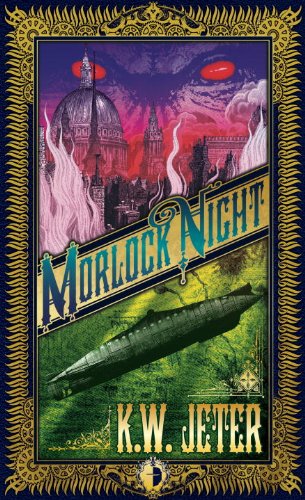[amazon_link id=”0857661000″ target=”_blank” ] [/amazon_link]Originally written as part of an Arthurian trilogy deal where K.W. Jeter (the author), Tim Powers and James Blaylock would resurrect Arthur at different crisis points, but though the deal faltered Jeter did not, and Morlock Night emerged in 1979 as the seminal “SteamPunk” novel.
[/amazon_link]Originally written as part of an Arthurian trilogy deal where K.W. Jeter (the author), Tim Powers and James Blaylock would resurrect Arthur at different crisis points, but though the deal faltered Jeter did not, and Morlock Night emerged in 1979 as the seminal “SteamPunk” novel.
Morlock Night picks up Wells’ narrative of the The Time Machine after the telling of the tale and its (we learn) overly optimistic end. When the traveler returns to the future to free the Eloi, we are told by the mysterious Dr. Ambrosia, he was met by a much better prepared and organized band of Morlock than he’d encountered before. Soon his blood was left spilled on the sands of that distant time, and the Morlocks were using the time machine as a troop carrier back to the only destination they could get it to go to…London in 1892.
This is the tale the enigmatic Dr. Ambrosia spins for one Edwin Hocker, a young London gentleman of some means who had been invited to hear the remarkable tale of time travel which would spur another of the audience to write it up for the Strand in due course. Hocker’s course lay in a different direction, as he was about to find out.
Scoffing at the Doctor’s fantasy sequel, Hocker parts ways with the man, clearly a lunatic, and finds himself thrust forward in time to a war torn London where Morlockian invaders are closing in on the final remnants of humanity’s forces. Fortunately for him he’s taken under wing by a stalwart girl named Tafe, who keeps him alive and whose spirit later inspires him to muse,
“How much better, it struck me, to have a woman as your comrade rather than as the fawning admirer and house-slave that so many men of my generation unfortunately insist upon! Surely in the future, if there was to be one, such an improvement in attitude would be universal throughout society.” – 188 MORLOCK NIGHT
Whisked back to his own time, with Tafe in tow, Hocker begrudgingly accepts the truth of the Doctor’s assertions. Morlocks are readying an invasion of their past, overuse of the time machine has disrupted the order of the cosmos, and nearly all is lost. It would take a hero of legendary proportion to meet such a threat, and Hocker is no King Arthur to rise with sword in hand and rally England.
Fortunately, King Arthur already has risen, Ambrosia tells our boy, and by the way you can call me by Merlin. Unfortunately, Merlin’s nemesis has robbed Excalibur of its power by tampering with its own time line, and the reborn Arthur, whose fate is entwined with the sword, is a feeble old man…wasting away.
Perhaps Hocker isn’t Arthur, but he’s a true Briton, and not about to let mankind (or England) go down without a fight, so he and Tafe accept Merlin’s charge to rescue the once and future king, grab the sword and swing for the fences. As it were.
The ensuing adventures owes considerably more to Verne than Wells, including a subterranean ocean with a stolen submarine and treasures of ancient Atlantis itself. And lots of foul Morlock.
In a fine afterword, Adam Roberts examines the “hectic masterpiece” that launched steampunk, defending the mad soup stirred up within the story. Morlocks in London’s Sewers, underground seas, Atlantis, Arthur, the time machine itself…pity there was no room for lions, tigers and bears (oh my). Jeter’s plots turn with too much agility to be considered lurching, but the tangents each leg takes are often surprising.
The book rushes to its conclusion after caroming around for the first two thirds, wrapping things up rather hastily, as though the author has had quite enough of the adventure and wishes it to be done with. A more leisurely plotting might have yielded a better work, but probably not one exciting.
It’s hard to view this story from its future, some thirty years hence, and determine whether it qualified as brilliant when it came out, but it’s easy to see its importance in the establishment of the genre imbued with Victorian marvels that has all but pushed cyberpunk off the shelves (not really, there’s plenty of dystopic space to go around).
Whether you’re looking to deconstruct Steampunk or just fire up the boilers for a fun read, Morlock Night is great place to start.